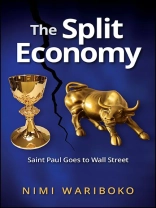Starting with Marx and Freud, scholars have attempted to identify the primary ethical challenge of capitalism. They have named injustice, inequality, repression, exploitative empires, and capitalism’s psychic hold over all of us, among other ills. Nimi Wariboko instead argues that the core ethical problem of capitalism lies in the split nature of the modern economy, an economy divided against itself. Production is set against finance, consumption against saving, and the future against the present. As the rich enjoy their lifestyle, their fellow citizens live in servitude. The economy mimics the structure of our human subjectivity as Saint Paul theorizes in Romans 7: the law constitutes the subject as split, traversed by negativity. The economy is split, shot through with a fundamental antagonism. This fundamental negativity at the core of the economy disturbs its stability and identity, generating its destructive drive.
The Split Economy develops a robust theoretical framework at the intersection of continental philosophy, psychoanalytic theory, theology, and political economy to reveal a fundamental dynamic at the heart of capitalism.
Mục lục
Acknowledgments
Introduction
Part I: Ontology. Subject in General: A Theory of Cracks
1. Sickness unto Excess
2. Saint Paul’s Notion of Split Subjectivity
3. The Split Economy
Part II: Particular Subject: Logic of the World of Finance
4. The Fantasy of Harmony
5. The Ethical Form of Finance
Part III: Singular-Plural Subjects: Deactivation of the Capitalist Future
6. Abolish the Future
7. Abundance, Scarcity, and Pluralism: A New Direction for Economic Theology
Epilogue
Notes
Works Cited
Index
Giới thiệu về tác giả
Nimi Wariboko is Walter G. Muelder Professor of Social Ethics at Boston University. His many books include
The Split God: Pentecostalism and Critical Theory, also published by SUNY Press;
Economics in Spirit and Truth: A Moral Philosophy of Finance; and
God and Money: A Theology of Money in a Globalizing World.







![Bìa của Brian Schrag & Julisa Rowe: Community Arts for God's Purposes [Chinese] 貼近神心意的社群藝術 Bìa của Brian Schrag & Julisa Rowe: Community Arts for God's Purposes [Chinese] 貼近神心意的社群藝術](https://static.worldofdigitals.com/thumb_webp/740/9781645083740.webp)




